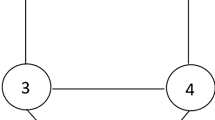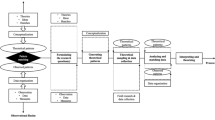Abstract
Relational quantum mechanics (RQM) proposes an ontology of relations between physical systems, where any system can serve as an ‘observer’ and any physical interaction between systems counts as a ‘measurement’. Quantities take unique values spontaneously in these interactions, and the occurrence of such ‘quantum events’ is strictly relative to the observing system, making them ‘relative facts’. The quantum state represents the objective information that one system has about another by virtue of correlations between their physical variables. The ontology of RQM thereby strives to uphold the universality and completeness of quantum theory, while at the same time maintaining that the actualization of each unique quantum event is a fundamental physical event. Can RQM sustain this precarious balancing act? Here we present five no-go theorems that imply it cannot; something has to give way.
Similar content being viewed by others
Notes
Many worlds interpretations, while possibly in some sense ‘relational’, do not endorse the uniqueness of relative facts.
Matthew Leifer calls them ‘Bell-Wigner mashups’ [30].
For instance, a pertinent criticism of QBism’s claim to locality can be found in Sect. 3.2. of Ref. [37].
Rovelli tends to eschew the terms “measurement”and “measurement outcome”in order to avoid the unwanted interpretational baggage that often accompanies these terms [43].
Note that the quantum events relevant for determining a system’s state are not only interactions with the system itself, but also interactions with other systems that have previously interacted with it.
For more about whether systems are real, see Rovelli’s remarks at the end of Sect. X in [43].
Which variable gets assigned to which role depends on which of the two systems we take as the observer.
Note that in light of RQM:5, the pointer variable here ought not to have any special status by virtue of being a “piece of paper”, i.e. something that you or I would intuitively recognize as a tool for keeping records. Other physical variables might serve equally well as apparatus pointers.
See Ref. [45], p.8-9: “there is no half-a-measurement; there is probability one-half that the measurement has been made! [...] Imperfect correlation does not imply no measurement performed, but only a smaller than 1 probability that the measurement has been completed”.
We acknowledge that Dorato already made this general point in Ref. [7]; we have just shored it up with mathematical arguments.
A subscripted index on \(b^{(\mathcal {W})}\) would be desirable to maintain consistency of the notation, but we will scrupulously follow the notation of the original authors.
Some readers might worry that this violates \(\mathcal {W}\)’s ‘freedom of choice’, but it is not at all clear that this is a legitimate complaint in RQM; after all, what if \(\mathcal {W}\) were just an asteroid, or an electron?
References
Rovelli, C.: Relational quantum mechanics. Int. J. Theor. Phys. 35(8), 1637–1678 (1996)
Laudisa,F., Rovelli,C.: Relational Quantum Mechanics. In: E. N. Zalta (ed.) The Stanford Encyclopedia of Philosophy. Metaphysics Research Lab, Stanford University, Spring (2021)
Di Biagio, A., Rovelli, C.: Stable facts, relative facts. Found. Phys. 51(1), 30, (2021)
Brown, M.J.: Relational quantum mechanics and the determinacy problem. Br. J. Philos. Sci. 60(4), 679–695 (2009)
Oldofredi, A.: The bundle theory approach to relational quantum mechanics. Found. Phys. 51(1), 18–18 (2021)
Calosi, C., Mariani, C.: Quantum relational indeterminacy. Stud. Hist. Philos. Sci. Part B 71, 158–169 (2020)
Dorato, M.: Rovelli’s Relational Quantum Mechanics, Anti-Monism, and Quantum Becoming. In: A. Marmodoro and D. Yates, (eds) The Metaphysics of Relations, pp. 235–262, Oxford: Oxford University Press, 2016
Smerlak, M., Rovelli, C.: Relational EPR. Found. Phys. 37, 427–445 (2007)
Krismer, R.: Representation lost: the case for a relational interpretation of quantum mechanics. Entropy 20, 975 (2018)
Laudisa, F.: The EPR argument in a relational interpretation of quantum mechanics. Found. Phys. Lett. 14, 119–132 (2001)
Laudisa, F.: Open problems in Relational Quantum Mechanics. J. Gen. Philos. Sci. 50, 215–230 (2019)
Bitbol,M.: Physical relations or functional relations? A non-metaphysical construal of Rovelli’s Relational Quantum Mechanics (2007). http://philsci-archive.pitt.edu/3506/
Martin-Dussaud, P., Rovelli, C., Zalamea, F.: The notion of locality in Relational Quantum Mechanics. Found. Phys. 49(2), 96–106 (2019)
Ruyant, Q.: Can we make sense of Relational Quantum Mechanics? Found. Phys. 48(4), 440–455 (2018)
Trassinelli, M.: Relational Quantum Mechanics and probability. Found. Phys. 48, 1092–1111 (2018)
van Fraassen, B.C.: Relational Quantum Mechanics: Rovelli’s world. Discusiones Filosóficas 11, 13–51 (2010)
Yang, J.M.: A Relational Formulation of Quantum Mechanics. Sci. Rep. 8(1), 13305 (2018)
Wood, D.: Everything is relative: Has Rovelli found the way out of the woods? (2010). http://dwolf.eu/uploads/2/7/1/3/27138059/rqm_essay_dwood.pdf
Rovelli, C.: An argument against the realistic interpretation of the wave function. Found. Phys. 46, 1229–1237 (2016)
Rovelli, C.: Space is blue and birds fly through it. Philos. Trans. R. Soc. A 376, 20170312 (2018)
Fuchs, C.A., Schack, R.: Quantum-Bayesian coherence. Rev. Mod. Phys. 85, 1693–1715 (2013)
Fuchs,C. A., Stacey, B. C.:QBism: Quantum Theory as a Hero’s Handbook,in Proceedings of the International School of Physics Enrico Fermi Course 197—Foundations of Quantum Physics (E. M. Rasel, W. P. Schleich, and S. Wölk, eds.), pp. 133–202, IOS Press, Amsterdam; Società Italiana di Fisica, Bologna (2019
Fuchs, C.A.: Notwithstanding Bohr, the reasons for QBism. Mind Matter 15(2), 245–300 (2017)
Fuchs,C. A.: On Participatory Realism. (2016). https://arxiv.org/abs/1601.04360 [quant-ph]
Fuchs, C. A.:QBism, the Perimeter of Quantum Bayesianism. (2010). https://arxiv.org/abs/1003.5209 [quant-ph]
Fuchs, C.A., Mermin, N.D., Schack, R.: An introduction to QBism with an application to the locality of quantum mechanics. Am. J. Phys. 82(8), 749–754 (2014)
Brukner, Č: A no-go theorem for observer-independent facts. Entropy 20(5), 350 (2018)
Brukner, Č.: On the quantum measurement problem, in Quantum [Un]Speakables II. The Frontiers Collection (B. R. and Z. A., eds.), Springer, Cham., 2017
Brukner, Č: Facts are relative. Nat. Phys. 16, 1172–1174 (2020)
Leifer, M. S.: What are Copenhagenish interpretations and should they be perspectival?, 2018. Talk given at Wigner’s Friend Workshop, Boston. Video available at www.youtube.com/watch?v=C-C_K-gK6q4
Baumann, V., Wolf, S.: On formalisms and interpretations. Quantum 2, 99 (2018)
Bong, K.-W., Utreras-Alarcón, A., Ghafari, F., Liang, Y.-C., Tischler, N., Cavalcanti, E.G., Pryde, G.J., Wiseman, H.M.: A strong no-go theorem on the Wigner’s friend paradox. Nat. Phys. 16, 1199–1205 (2020)
Baumann, V., Del Santo, F., Brukner, Č: Comment on Healey’s quantum theory and the limits of objectivity. Found. Phys. 49, 741–749 (2019)
Frauchiger, D., Renner, R.: Quantum theory cannot consistently describe the use of itself. Nat. Commun. 9, 3711 (2018)
Healey, R.: Quantum theory and the limits of objectivity. Found. Phys. 48, 1568–1589 (2018)
Proietti, M., Pickston, A., Graffitti, F., Barrow, P., Kundys, D., Branciard, C., Ringbauer, M., Fedrizzi, A.: Experimental test of local observer independence. Sci. Adv. 5(9), eaaw983 (2019)
Cavalcanti, E.G.: The view from a Wigner Bubble. Found. Phys. 51, 39 (2021)
DeBrota, J.B., Fuchs, C.A., Schack, R.: Respecting one’s fellow: QBism’s analysis of Wigner’s Friend. Found. Phys. 50, 1859–1874 (2020)
Baumann, V., Brukner, Č: Wigner’s Friend as a rational agent. In: Hemmo, M., Shenker, O. (eds.) Quantum, Probability, Logic: The Work and Influence of Itamar Pitowsky, pp. 91–99. Springer, Cham (2020)
Pienaar, J.: QBism and Relational Quantum Mechanics compared (2021). https://arxiv.org/abs/2108.13977
Muci no,R., Okon,E., Sudarsky, D.:Assessing Relational Quantum Mechanics (2021). https://arxiv.org/abs/2105.13338 [quant-ph]
Bell, J.: Against ‘measurement’. Phys. World 3, 33–41 (1990)
Rovelli, C.: A response to the Muci no-Okon-Sudarsky’s Assessment of Relational Quantum Mechanics (2021). https://arxiv.org/abs/2106.03205 [quant-ph]
Pienaar, J.: Comment on the notion of locality in Relational Quantum Mechanics. Found. Phys. 49, 1404–1414 (2019)
Rovelli, C.: Relational Quantum Mechanics, 1997. Unpublished update of Ref. 1, arxiv:9609002v2 [quant-ph]
Uola, R., Costa, A.C.S., Nguyen, H.C., Gühne, O.: Quantum steering. Rev. Mod. Phys. 92, 015001 (2020)
Kirkpatrick, K.A.: The Schrödinger-HJW theorem. Found. Phys. Lett. 19(1), 95–102 (2006)
Stoljar, D.: Physicalism, in The Stanford Encyclopedia of Philosophy (E. N. Zalta, ed.), Metaphysics Research Lab, Stanford University, spring 2021 ed., 2021
Thornton, S. P.: Solipsism and the problem of other minds. In: The Internet Encyclopedia of Philosophy (2021)
Huxley, A.: The Doors of Perception. Harper & Brothers, New York (1954)
Acknowledgements
Some ideas in this work were inspired by unpublished notes of Rüdiger Schack and Blake Stacey. I am grateful to Carlo Rovelli, Andrea Di Biagio and Federico Laudisa for answering many of my questions about the principles underlying RQM, although they probably disagree with the conclusions I have drawn from those principles. This work was supported in part by the John E. Fetzer Memorial Trust.
Author information
Authors and Affiliations
Corresponding author
Additional information
Communicated by Carlo Rovelli
Publisher's Note
Springer Nature remains neutral with regard to jurisdictional claims in published maps and institutional affiliations.
Rights and permissions
About this article
Cite this article
Pienaar, J. A Quintet of Quandaries: Five No-Go Theorems for Relational Quantum Mechanics. Found Phys 51, 97 (2021). https://doi.org/10.1007/s10701-021-00500-6
Received:
Accepted:
Published:
DOI: https://doi.org/10.1007/s10701-021-00500-6




